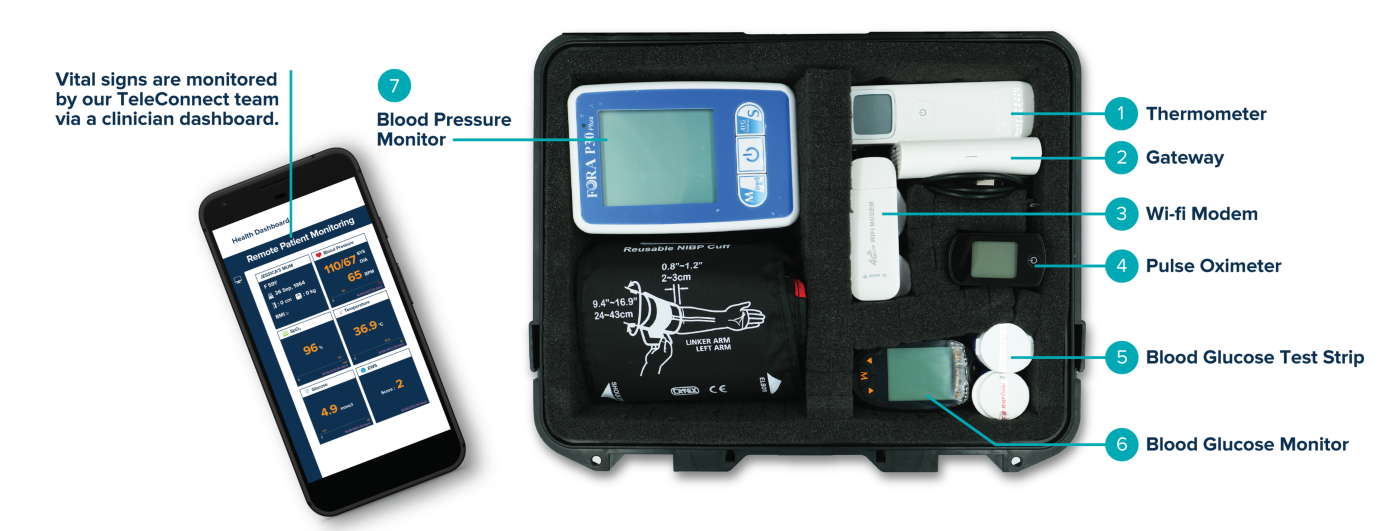
All patients in SeniorConnect are provided a kit whereby their vital signs are monitored and regularly transmitted to the TeleConnect team.
Many diseases don’t just cease after a visit to the doctor. Some evolve over a period of months, while others stay with the patient for the rest of their lives. So what happens to the patient when the disease is still lingering and evolving after a visit to the doctor?
Subang Jaya Medical Centre’s (SJMC) Connected Care utilises the latest in technology to bring healthcare into the homes of patients. Connected Care helps bridge that time between doctor visits, when the patient can still be assessed and evaluated without needing to go to the hospital.
“We learned a lot from the Covid-19 pandemic,” says SJMC consultant cardiologist Dr Navin Sukilan.
“Even though patients couldn’t freely make their way to hospitals, they still needed to be looked after. There had to be ways to expedite communication between doctors and patients.
“Basically, this is when Connected Care started. Now, we have services whereby patients can call up to speak to nurses or doctors about their condition and their concerns, and further action can be taken.”
And perhaps this is one of the silver linings of the Covid-19 situation, from which the healthcare industry has learned to more effectively use technology to care for patients.
Pillars of continuity

“SeniorConnect helps us to bridge the time between the actual appointment and the months before the next consultation is scheduled," says SJMC consultant cardiologist Dr Navin Sukilan.
According to Dr Navin, Connected Care has a group of frontliners – many of whom are based in Accident and Emergency (A&E) – to assess what’s going on with patients who connect with them, and they will quickly assess what further action needs to be taken, and if a referral to the patient’s specialist consultant is necessary.
Connected Care comprises six main pillars, of which two are now currently ongoing: TeleConnect and HomeConnect.
Now, the third has recently been launched – SeniorConnect – which aims to ensure that elderly patients are sufficiently monitored outside the hospital environment so that any adverse changes to their health can be detected early and intervention provided to prevent serious consequences.
“This is a service that’s especially recommended for those above 65 years,” says Dr Navin.
“Those in this age group tend to be a bit limited in their mobility; some don’t have close support as their children may be overseas and so on. These patients do come in for follow-ups, but between follow-ups, if anything were to happen, what then?
“SeniorConnect helps us to bridge the time between the actual appointment and the months before the next consultation is scheduled.
“Many elderly patients live with chronic conditions such as hypertension, heart failure, etc. Such diseases can be very dynamic, and adverse changes can occur quite quickly.
“These patients need to be monitored regularly, and not all can come in regularly to see their doctor. This system can help overcome this problem,” he adds.
All patients in SeniorConnect are provided a kit whereby their vital signs are monitored and regularly transmitted to the TeleConnect team.
This kit consists of a blood pressure monitor, a glucometer, thermometer, pulse oximeter, Wi-Fi modem and gateway, so the system will work even when you don’t have Wi-Fi at home.
If your vital signs reveal anything out of the ordinary, you will be contacted for further follow-up.
Remote care
Though some may be concerned that such a system may affect the doctor-patient bond, Dr Navin does not think so.
“In fact, I think it will forge a closer bond. This system enables the doctor to regularly keep an eye on their patients, and the patient is aware of that.
“However, it has to be emphasised that such care is not a replacement for the traditional doctor consultation. We still need a doctor’s personal touch when administering treatment.”
Those interested in SeniorConnect or Connected Care can email connected.care@asia1health.com or call TeleConnect at 03-5639 1818.
At the moment, the service is limited to only Klang Valley residents. This will change in the future as the service expands.
There will be three other pillars to be launched – GPConnect, ICUConnect and HospitalConnect.
Together, all six pillars will synergise to bring healthcare closer to our loved ones, and our homes.
Source: The Star
